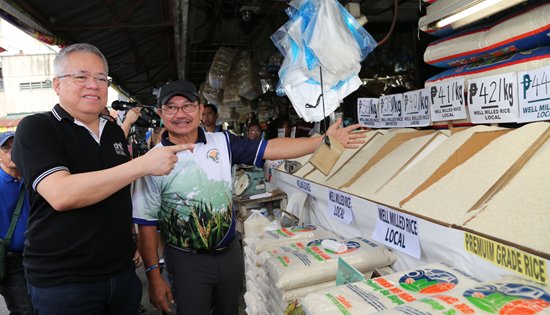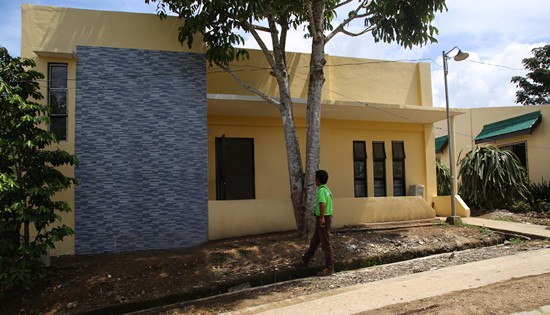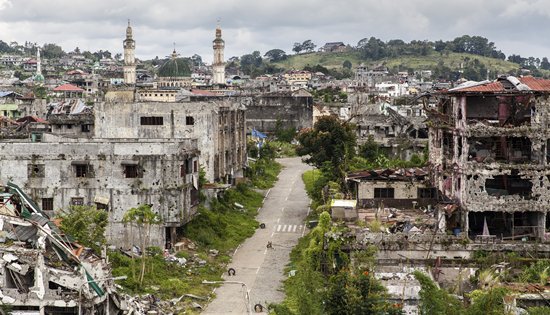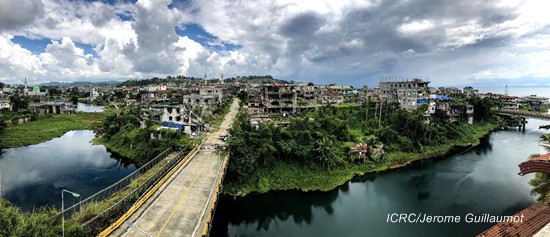NMP women
employees learn self-defense

By
National Maritime
Polytechnic
October 31, 2018
TACLOBAN CITY –
Taking into account the vulnerability of women to be exposed to
dangerous situations such as sexual abuses, stalking, and
harassment, among others, has made self-defense an essential
priority for women today in order to protect themselves against
these threatening situations.
As part of the
capacity-building activities on Gender and Development (GAD)
advocacy and empowerment, the National Maritime Polytechnic (NMP)
conducted Basic Self-Defense to its women personnel to equip them
with strategies to adopt under different adverse circumstances.
The activity aimed to
increase the knowledge of the participants on understanding and
adopting personal safety habits and learn to develop some basic
self-defense techniques and tactics that may help them be more
aware, prepared, and ready for any situation that may occur in
everyday life on a given day.
Twenty-two (22) women
personnel initially participated in the said training program held
every Friday afternoon, which commenced on 12 October 2018 at the
NMP Gymnasium. The last session is scheduled on 09 November 2018.
NMP tapped the expertise
of FO3 Anthony Alvin S. Duran, Fire and Arson Investigator of the
Bureau of Fire Protection (BFP) RO 8. FO3 Duran is a 2nd Dan Black
Belt of the Philippine Black Cat Karate-do Inc. (Okinawan ShorinRyu).
He is affiliated with the Philippine Karate-do League (PKL).
The main goal of the said
undertaking was to strengthen women’s capacity to defend themselves
against potential attacks, creating a strong mindset that could
allow them to react sensibly in every situation, and help them feel
safer and more confident.
Further, the conduct of
the activity was also in line with Republic Act 9710 or Magna Carta
of Women, a comprehensive women’s human rights law that seeks to
eliminate discrimination against women by recognizing, protecting,
fulfilling and promoting the rights of Filipino women, especially
those in marginalized sector.
Meanwhile, NMP continues
to upgrade its facilities and provide maritime trainings required
pursuant to the STCW Convention as amended in 2010 including
value-adding courses towards improving the qualifications of
Filipino seafarers for their employment acceptability and enhanced
competitiveness. It also regularly conducts maritime studies to come
up with policies for the improvement of the manpower sector of the
industry.
Those interested in NMP
research undertakings may visit the NMP website (www.nmp.gov.ph) and
access the e-Research Information System Portal which is designed to
gather inputs for NMP’s research, dissemination of NMP completed
researches and other articles pertaining to maritime research.
For more information about
NMP trainings viewers may visit the agency’s facebook page (www.facebook.com/nmptrainingcenter)
where all related information on NMP trainings are available.
NMP also encourages
seafarers to avail of the NMP-OWWA (Overseas Workers Welfare
Administration) Seafarers’ Upgrading Program (SUP) which entitles
the beneficiary to receive financial assistance for training costs
from the OWWA.
DTI, DA, NFA
launch prescribed labeling, SRP for rice

By
DTI-OSEC-PRU
October 30, 2018
MAKATI CITY –
Department of Trade and Industry (DTI) Secretary Ramon Lopez,
Department of Agriculture (DA) Secretary Emmanuel Piñol, and the
National Food Authority (NFA) Deputy Administrator Tomas Escarez
joined forces in launching the prescribed labeling and suggested
retail price (SRP) for milled rice on 27 October 2018 at
Commonwealth Market in Quezon City.
There are four
classification of milled rice – regular milled, well milled, premium
grade, and special rice – which will be sold following the mandated
SRPs except for special rice that covers organic, Cordillera
heirloom, and other indigenous varieties.
The SRPs for imported rice
are: P39 per kilo for well-milled, P40 per kilo for imported premium
grade two, and P43 per kilo for premium grade one.
Meanwhile for local rice,
the SRPs are: P39 per kilo for regular-milled, P44 per kilo for
well-milled, and P47 per kilo for premium grade rice.
The government also banned
the use of brand names like Sinandomeng, Dinorado, and Angelica to
avoid deceptive labeling. These brands will be placed under premium
grade rice classification.
The prescribed labeling as
well as the SRPs is now being implemented in the entire Metro Manila
and cities within the Greater Manila Area. Other regions will follow
this scheme after All Souls’ Day. The SRPs on rice will be reviewed
and updated regularly.
Sec. Piñol said that
penalties and sanctions will be imposed to retailers who will not
comply with the SRPs. These include possible revocation of licenses,
corresponding fines, as well as criminal charges from four months to
four years.
Following the Joint
Memorandum Circular signed by DTI and DA on 18 October, Sec. Lopez
said that DTI now has the authority to monitor prices of rice and
penalize violators. He explained that DTI will follow the same
procedure done in monitoring SRPs of manufactured basic necessities
and prime commodities. The agency will initially issue Letters of
Inquiry to those who will not comply with the SRP of rice. Notice of
Violation will then follow when they don’t correct it as prescribed,
and depending on the gravity of the offence as well as size of the
business, penalties will be imposed ranging from P2,000 to maximum
of P1 million.
The trade chief also
announced the implementation of Presyong Risonable Dapat (PRD)
program of DTI, which will allow retailers to directly import rice
and sell it to the public at P38 per kilo. This will eliminate the
layers of traders and ensure immediate availability of affordable
rice in the market. The program started with four retailers applying
to import 20,000 MT of rice each.
Two members of
paramilitary group charged with murder of Lumad student
By
KARAPATAN
October 29, 2018
QUEZON CITY – In a
resolution, the Department of Justice found probable cause to charge
Ben Salangani and Joven Salangani, members of paramilitary group
Alamara, for the murder of 19-year old Lumad Obello Bay-ao, a
student of the alternative school Salugpongan Ta’Tanu Igkanogon
Community Learning Center (STTICLC).
Bay-ao’s parents through
their legals counsels from the National Union of Peoples Lawyers
received a copy of the resolution dated May 21, 2018 only yesterday.
Bay-ao was killed on
September 5, 2017 in Talaingod, Davao del Norte. He and his family
were among the more than 200 Lumad residents in the community who
fleed in July 2017 due to threats of the Alamara members and
military operations of the Armed Forces of the Philippines. The
evacuees returned to their community in August 2017.
The Alamara is among the paramilitaries or force multipliers
accredited by the Citizens Armed Forces Geographical Unit (CAFGU)
under the command of the 60th Infantry Battalion- Philippine Army.
“The arrest of Ben and Joven Salangani is long overdue. Their
coddlers in the 60th IBPA and the Eastern Mindanao Command should
not only surrender them. They should also be charged for their
complicity in the killing of Bay-ao and their military operations in
Talaingod which led to this dastardly crime,” said Karapatan
Secretary General Cristina Palabay.
“Obello Bay-ao is among the many victims of extrajudicial killings
in the Philippines that happened while martial law is imposed in
Mindanao by President Rodrigo Duterte. Many military and
paramilitary men are still on loose sowing terror in peasant and
Lumad communities. Many are yet to be prosecuted due to the climate
of impunity that exists,” Palabay added.
Before he was killed, Bay-ao joined the protest caravan called
Lakbayan ng mga Pambansang Minorya in Manila on August 2017. Through
his dying declaration to one of the witnesses, Bay-ao was able to
identify Ben and Joven Salangani as those who shot him. Witnesses
also identified the two as among those who shot Bay-ao.
“The culpability of paramilitaries such as the Alamara in the
killing of Bay-ao affirms that the AFP and its adjuncts are into the
business of murdering civilians. This has been the case in the
massacre in Lianga, Surigao del Sur in September 2015. This is once
again apparent in the massacre of the nine peasants in Sagay, Negros
Occidental by the Special Civilian Auxiliary Army of the Armed
Forces of the Philippines and mercenary private armies of
landlords,” she said.
“We stand with the family, friends, fellow students and community of
Obello Bay-ao and of all those killed by State forces under the
Duterte regime in their continuing quest for justice. We reiterate
our call for the disbandment of paramilitary groups and for the
Duterte regime to end its attacks against the Filipino people,”
ended Palabay.
|

The
completed Climate Change and DRRM Office of the Department
of Agriculture in Brgy. San Agustin, Gandara, Samar. |
DPWH delivers
P9-M projects to the Department of Agriculture
By
MAE ANGELICA R. COMOTA
October 25, 2018
CALBAYOG CITY – The
Department of Public Works and Highways Samar First District
Engineering Office (SFDEO) completes the construction of various
projects under its convergence program with the Department of
Agriculture (DA).
These four projects have a
combined allocation of P9.27 million sourced from the Yolanda
Recovery and Rehabilitation Program (YRRP) Fund of 2017, broken down
as follows: 1) Establishment of Climate Change and Disaster Risk
Reduction Management (DRRM) Office, Gandara costing P2.5 million; 2)
Rehabilitation of Staff House, San Jorge costing P2.58 million; 3)
Rehabilitation of Guest House, San Jorge costing P2.5 million; and
4) Rehabilitation/ Re-establishment of Plant Nursery Shed Storage,
San Jorge costing P1.18 million.
The flagship project among
the four is the establishment of the climate change and DRRM office
in Gandara.
As a country that is
always hampered by typhoons, every station under the Department of
Agriculture has a climate change and DRRM office. Its purpose is to
monitor data relevant to the DA’s disaster preparedness activities.
“Here in Samar, we have
identified Gandara as a disaster-vulnerable area. The office will
help us determine the volume of buffer seeds and livestock needed by
the farmers of the affected community to avoid food shortages during
calamities.” said Mr. Rolando Hepe, an officer of the DA and focal
person of the Yolanda Recovery and Rehabilitation Program.
|

SFDEO’s
Inspectorate Team during their inspection of the recently
completed flood control structures along Jibatang River
(upstream), Brgy. Mag-Ubay, Calbayog City. |
DPWH
completes P150-M flood control structures in Calbayog
By
MAE ANGELICA R. COMOTA
October 25, 2018
CALBAYOG CITY – The
Department of Public Works and Highways Samar First District
Engineering Office (SFDEO) completes the construction of flood
control structures along Jibatang River in Calbayog City, Samar.
SFDEO implements five
flood control projects along Jibatang River benefiting barangays
Jose Roño, Mag-Ubay, and Capacuhan which are all situated along the
river’s primary stream network.
These projects cover the
construction of 1.197 kilometers of flood mitigation structures and
have a combined allocation of P153 million sourced from the 2018
General Appropriations Fund.
According to the flood
mapping conducted by UP Diliman and Visayas State University in
2017, recent typhoons have brought continuous torrential rains that
caused flood waters to rise up to two meters and above – directly
affecting the residents living within the river’s vicinity.
With the completion of
these projects, there will be better prevention of the occurrence of
catastrophic flood and a higher assurance of safety for the
residents and their properties.
|

During
the signing of contract with Studio Gale (South Korea),
August Media (Singapore), Synergy 88 (Philippines) and
Karrot Entertainment (London) for the production of 2D
entertainment and educational television series called “Tish
Tash.” From left: Jyotirmoy Saha, CEO at August Media
Singapore; Elize Estrada of Synergy88; Jackeline Chua,
Managing Partner at Synergy88 Philippines; Undersecretary
Mon Ibrahim of the Department of Information and
Communications Technology (DICT); Assistant Director Anthony
Rivera of Department of Trade and Industry-Export Marketing
Bureau; Froilan Pamintuan of Philippine Trade and Investment
Center France; and Emmylou Delfin of DICT. |
PH animation
shines at MIPCOM 2018
By
DTI-TIPG
October 24, 2018
MAKATI CITY – THE
Philippine animation industry has been featured as a major
international content player at the annual Marche’ International des
Programmes de Communications (MIPCOM), the convergence of the
world’s most influential industry players in global television and
entertainment, which include major acquisition executives,
production studios, and producers who seek the right partners in
television, film, web-based over the top (OTT) services or
subscription video on demand (SVOD), live-action, and animation.
The Philippine delegation
to this year’s MIPCOM, which opened its doors to 3,800 delegates and
4,800 buyers from 110 countries, offered the world-renowned
animation capabilities of Filipinos and the country’s own creative
intellectual Property (IP) assets.
Philippine companies also
actively engaged in business meetings and networking activities held
on the sidelines of MIPCOM 2018. They benefited from the sharing of
information on industry trends with other companies through a series
of talks conducted at the Palais des Festival in Cannes from October
15 to 18, 2018.
Through the MIPCOM, they
were able to re-connect with their previous business leads and
existing clients and forge partnerships with global studios for
animation services, co-production, and content distribution.
The delegation also
included animation companies like the Manila-based Toon City, which
ranked 22nd of the 50 best animation studios in the world, and
Synergy 88, which featured the Filipino Anime series “Barangay 143”
currently airing on GMA Network.
Among other animation
companies that participated in MIPCOM 2018 were ASI Animation
Studios Inc., Toast & Brew Animation and Game Design Studios,
IdeaQuest Studios, and Xentix Toon.
The Philippines’ presence
in the event also secured its reputation as a competent source of
game development and animations services. Through MIPCOM, the
country also urged IP asset owners to take advantage of the growing
Philippine content market.
“We are here to support
the Animation Council of the Philippines Inc. (ACPI),” said
Undersecretary Monchito Ibrahim of the Department of Communications
and Information Technology (DICT).
“As a first timer to
MIPCOM, I have come to realize that this is not just any event, but
the global marketplace for content, where deals are done instantly,
and where entertainment companies are now more than ever in need of
more content such as animation, film, and drama, among others” he
added.
This year, the delegation
also focused on promoting the Philippine services for global
animation and on upholding the IP assets or the content developed by
Filipinos.
The business matching
component of the country’s participation in MIPCOM was led by the
Department of Trade and Industry-Export Marketing Bureau (DTI-EMB)
while the exhibition component was managed by the DICT.
Meanwhile, Undersecretary
Nora Terrado of the DTI-Trade and Investments Promotion Group, which
administers the EMB, said that the delegation’s participation in the
MIPCOM reflected the strong capabilities of Philippine creative
industries.
“We are glad that Filipino
animators are now taking advantage of the opportunities in the
global content market,” she said.
“We at the DTI are working
hand in hand to give our local creative industries sufficient
support and fitting avenues that can help them grow and flourish,”
she added.
As it gathered global
acquisition executives, production studios and producers,
distributors, and content creators to discuss trends, MIPCOM has
also seen a strong collaboration among the DTI, DICT, and the Film
Development Council of the Philippines (FDCP).
“Animation is one of our
strengths and one of the shows we are promoting here is ‘Barangay
143,’ the Philippines’ first-ever anime” said FDCP Executive
Director Wilfredo C. Manalang.
The delegation also
received support from the country’s two major media networks GMA 7
and ABS-CBN, as well as from ACPI members Toon City, ASI Studio,
Synergy88 Digital Inc., Toast and Brew Studios, and Idea Quest.
|

The
devastated area of Marawi City, Lanao del Sur, also known as
the "most affected area". Reconstruction has not started and
thousands of residents remain displaced, a year since the
conflict ended. (Photo by ICRC/Jerome Guillaumot) |
Uncertainty looms
large over thousands still displaced in Marawi
By
ICRC
October 23, 2018
MANILA – One year
since fighting officially ended in Marawi City, Lanao del Sur, the
return home and certainty about the future continue to elude over
65,000 displaced people. They demand urgent action and support to
overcome the burden left in the wake of the conflict.
“They struggle every day
to make ends meet with whatever help they can get, as uncertainty
about their homecoming adds to their worries,” said Meher
Khatcherian, head of the International Committee of the Red Cross (ICRC)
office in Iligan City. “They deserve support and clarity about the
future. Though there have been some positive developments, the
people of Marawi had hoped for more to be done by now.”
Whether they are living
with relatives, in evacuation centers or in transitional sites, the
families that have been displaced do not have regular access to
potable water and proper sanitation facilities. Adults lack adequate
livelihood opportunities, while their children’s education remains
disrupted. Families of people who went missing in Marawi need to be
accompanied during the process of clarifying the fate of their
missing loved ones.
Having witnessed the
plight of the people firsthand since clashes broke out in May 2017,
Khatcherian and his team have worked to help the affected people
from Marawi, bringing in whatever respite possible. Together with
the Philippine Red Cross (PRC), the ICRC continues to focus on the
evolving needs of the people.
Addressing gaps while
awaiting the start of the rehabilitation phase, in coordination with
other aid organizations and the authorities, the ICRC and the PRC
have distributed cash grants to thousands of returnee families,
helping them restore their livelihoods.
Besides this, tools to
repair their shelters have been given to residents through the PRC.
The authorities have been provided with technical support to ensure
smooth functioning and potential expansion of the city’s water
network. Assisting the health-care facilities, essential medicines
and supplies have been distributed to them in Lanao del Sur.
“But there is one thing
that remains a top priority for the displaced families and it’s the
need to get clarity about their future so that they can move ahead.
After having their lives completely disrupted by the five-month
conflict, and their properties destroyed, they need to regain a
sense of ownership about their future. Their voices need to be
heard,” Khatcherian concluded.
The ICRC is a neutral,
impartial and independent humanitarian organization working to
prevent and alleviate suffering during armed conflict and other
situations of violence. It also visits people detained in relation
to the conflict to monitor their treatment and living conditions,
and facilitates visits from their families.

1 in every 7
teachers face GSIS loan woes
By
Alliance of Concerned
Teachers
October 23, 2018
QUEZON CITY – More
than 122,000, or 1 in every 7 public school teachers, are confronted
with due and demandable loan arrears which need to be settled until
October 31 as per the records of the Government Service Insurance
System (GSIS). Teachers protested over the ballooning of arrears
which are mainly caused by the failure of GSIS and the Department of
Education (DepEd) to make the agency-to-agency loan payment work
through the automatic salary deduction system.
In a tripartite dialogue
with GSIS and DepEd arranged by ACT Teachers Party-list last week,
both agencies refused to take responsibility for the debacle. GSIS
denied teachers' demand to condone the compounded interests and
penalties and warned instead of an additional 12% interest
imposition if arrears are not settled on the set deadline. DepEd, on
the other hand, offered no reprieve and even called on teachers to
'cooperate and move forward,' saying that the problem was the doing
of past administrations.
“The two agencies have
created a colossal problem but refuse to take any responsibility. It
is highly unfair that they want to penalize teachers for the failure
of their rotten systems,” said Joselyn Martinez, chairperson of the
Alliance of Concerned Teachers (ACT) Philippines.
Martinez hold the DepEd
accountable for many years that it has “illegally prioritized the
deduction of loan payments for private lending institutions instead
of the GSIS.” She added that this is a classic example of how
teachers are made to suffer due to corruption within the agency.
“GSIS cannot evade
accountability as well. What did the agency do during those years
when DepEd was not remitting loan payments? Apparently, GSIS likes
it better for loans to compound as it spells bigger profits for
them,” Martinez stated.
Martinez denounced GSIS'
unbending stand to make teachers shoulder the full cost of the
arrears when “the problem of incompatible and unreliable computer
systems of both agencies remain unresolved.”
“Even if teachers settle
their arrears now through restructuring, the problem will only
repeat as the roots of the problem are not addressed,” she lamented.
Martinez said that the
stance of both agencies show their “insensitivity and complete
disregard of teachers’ welfare in the midst of soaring inflation and
erosion of the purchasing power of teachers' salaries.”
“Teachers apply for loans
mainly due to scant salaries and not because of whims or caprices.
The inadequacy of pay remains the reason for our inability to pay
the arrears, which in the first place are unjustly computed. This is
not acceptable to teachers,” said Martinez.
ACT reiterated their
demand to the Duterte administration for substantial salary increase
of P30,000 for Teacher 1. They also push for an immediate increase
of the Personnel Economic Relief Allowance (PERA) from P2,000 to
P5,000 to cope with the soaring inflation.